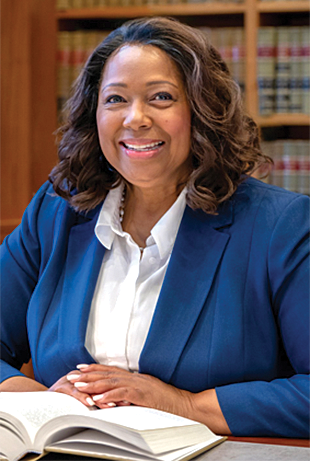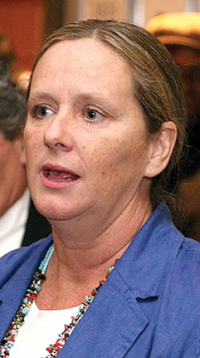September 11, 2024


If the Boston City Council can be a steppingstone to the mayor’s office or a seat in Congress, it can also be an exit ramp to elected office in county government, offering the prize of job security and a lower profile with the consolation of higher pay.
For at least the last two decades, that was how it worked for a string of council alums, from Maura Hennigan and Francis “Mickey” Roache to Felix D. Arroyo and Stephen Murphy. If their competition claimed more relevant qualifications, that could always be trumped by the recognition of a name and a face, enhanced by an afterglow of incumbency.
In last Tuesday’s Democratic primary to nominate a candidate – to be unopposed in November – for Clerk of the Supreme Judicial Court, the story changed with the victory for Allison Cartwright, a first-time candidate who received 59.7 percent of the vote in Boston. An attorney and community leader from Hyde Park, Cartwright dealt a rare setback to a candidate from the council, in this case, a second term at-large member from Dorchester, Erin Murphy.
But a break in one pattern can still be viewed as a persistence in others: the clout of areas with higher turnout, already trending as more politically progressive, and the advantage of recognition by association, which can also be limited by shelf life.
In last year’s election, Murphy finished second for councillor-at-large, showing strength in parts of Dorchester and in some other neighborhoods around the city. Though she finished second again on Tuesday, an incumbent’s run for one of four seats on the council is not the same as one-on-one match for a single open position. And this year’s primary was no match for the higher turnout in last year’s final election for City Council, which combined limited competition for at-large seats with open competition in three districts.
In last year’s election, Murphy was the top vote-getter in high-turnout Ward 20 (West Roxbury and part of Roslindale) and Ward 1 (East Boston). In this year’s primary, both wards were carried by Cartwright, whose supporters – pictured on campaign literature – included two current officeholders from East Boston: State Sen. Lydia Edwards and District 1 City Councillor Gabriela Coletta Zapata. In her campaign finance reports, Murphy showed contributions by figures from East Boston’s political past: John Nucci, Sal LaMattina, and Carlo Basile.
Murphy did have the support of current officeholders from South Boston (State Sen. Nick Collins and District 2 City Councillor Ed Flynn) and Dorchester (State Rep. Dan Hunt and District 3 City Councillor John FitzGerald). As was the case last year, she was the top vote-getter in South Boston precincts, in Dorchester’s Ward 16 (Neponset and adjacent areas), and in Ward 13, Precinct 10 (Savin Hill).
In Ward 13, Precinct 10, Murphy received 50.1 percent of the vote, to 46.5 percent for Cartwright. The margin was smaller than it was last year, when Murphy got 52.1 percent. Even that margin was smaller than the 53.1 percent won in the 2021 final election for mayor by another at-large councillor from Dorchester, Annissa Essaibi George, over her colleague at the time, Michelle Wu. And this year’s margin in the precinct wasn’t enough to keep Cartwright from winning the total vote in Ward 13 and Dorchester’s remaining wards.
Another indicator of change was in Ward 17, Precinct 13 (Cedar Grove/Lower Mills). Murphy was the top vote-getter here last year, but on Sept .3 the precinct was carried by Cartwright, who also carried the adjoining Lower Mills precinct and the total for the ward. Last year in Precinct 14, Murphy finished third, behind two colleagues – Ruthzee Louijeune and Julia Mejia.
Though Murphy carried Ward 16 this year with another boost from high-turnout Precinct 12, including many elderly voters in Keystone Apartments and first responders, the overall turnout was 14.9 percent, only slightly above the citywide figure of 14.25 percent. But the overall turnouts were higher in two areas with a larger pool of Democratic voters: Ward 20 (20.2 percent) and parts of Roslindale and Jamaica Plain in Ward 19 (22 percent). If Murphy could boast 298 votes from Ward 16, Precinct 12, Cartwright could boast 307 votes from the Jamaica Plain Ward 19 precinct around the Brewery complex and 277 from Precinct 2 (Jamaica Hills).
In the South Boston precincts carried by Murphy, the turnout was even lower, at 9.2 percent. Though she also carried Ward 2 (Charlestown) and repeated her Ward 1 precinct victories around Orient Heights, her other pockets of strength were scattered—including just three of 23 precincts in Ward 18 (Hyde Park-Roslindale-Mattapan), in the Fairmount, Readville, and Georgetowne areas.
Along with carrying Dorchester outside Ward 16, Cartwright dominated in Roxbury and Mattapan, also outpolling Murphy from the Ward 18 to the Back Bay, South End, Chinatown, and Allston-Brighton. Matching the territory was the slate of 22 endorsers, some with faces widely familiar, lined up in rows on Cartwright’s campaign literature. In addition to Wu, Congresswoman Ayanna Pressley, and state Attorney General Andrea Campbell, there were two state representatives for parts of Dorchester and Mattapan: Russell Holmes and Brandy Fluker Oakley.
In campaign finance reports, both candidates were almost evenly matched, with Cartwright’s total from April through August reaching slightly more than $100,000 and Murphy’s total for the same period a little greater than $106,000. Cartwright had more contributions from attorneys, along with a PAC for the Boston Teachers Union, while Murphy had more contributions from unions representing first-responders and workers in the building trades. Though unions are a longtime asset in Boston elections, there can be less political exchange value when workers live outside the city.
Murphy had a clear edge in the number of contributors who were at one time in elected office, including two formerly from Dorchester: Larry DiCara and Paul White. And both candidates reported contributions from former Boston City Councillor Mike Ross.
Also among Cartwright’s contributors was Stacey Borden. In her first run for office, to receive the Democratic nomination for Governor’s council in the 4th District, Borden was endorsed by Pressley. Borden got 39.4 percent of the vote, compared with 56.7 percent won by Christopher Iannella, Jr., an incumbent and member of the Governor’s Council for 37 years.
Since at least the end of World War II, only one political figure in Boston has managed the reverse pattern, going from City Council to county office and then to the mayor’s office – John F. Collins. Before election to the council after having been stricken with polio, Collins had served in the Legislature. While on the council, he was appointed as Suffolk County Register of Probate in 1956. Three years later, in a hotly contested open race for mayor, he scored an upset victory over South Boston’s John E. Powers, who had risen from clam-digger and machine-operator to state Senate president.


